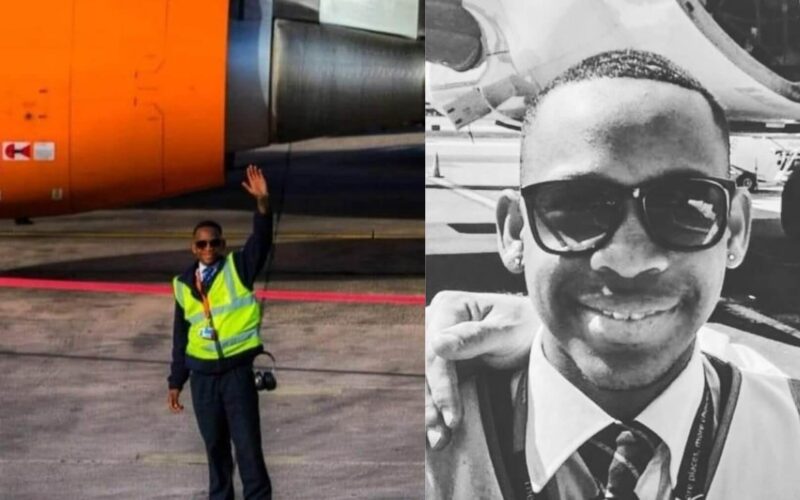A flight dispatcher Rodney Kuimba had worked in the aviation sector for more than 6 years before the pandemic. Now the aviation professional helps out in a Covid testing center in the UK and says he can not hide the frustration over the lost job. Rodney says the stagnation in the aviation industry hit him so hard that he feels like he had lost his identity during the crisis.
Inspired by his parents who both were involved in the aviation industry, Rodney decided to follow family steps and started the career doing baggage handling as a ramp agent in 2014. The first job in the industry went well and he soon received a promising offer to move into operations as a flight dispatcher.
“I followed my mom and dad’s footsteps. Also, my nephew is a captain on the Boeing 737, my brother is an aircraft engineer, so that‘s how I got involved in the industry,” Rodney smiles.
“I did it for five years with EasyJet working as a flight dispatcher. And then towards the end of my years with EasyJet, I was also the engagement officer. It was a really enjoyable experience, it was just an airline that was really close to my heart.”
During his years in the aviation field, Rodney has worked for a few recognizable air carriers including Lufthansa (LHAB) (LHA), Thomas Cook, Virgin Atlantic, and others. The flight dispatcher was constantly striving to improve his skills, aiming to reach the highest levels of professionalism in a position. Just before the first pandemic hit, Rodney had been busy expanding his knowledge while doing some training at London Gatwick Airport in the UK, where Virgin Atlantic, his former employer, was based.
“I was doing my training at London Gatwick last March, then the Covid came. Unfortunately, four days before my graduation, the course was suspended. From March to September 2020 I was furloughed, but I got a chance to go back to work in September. However, due to a massive fall in passenger demand, I lost my job again in October last year.”
Rodney says that after years of satisfying experience while working with airlines, the break made him feel devastated. The flight dispatcher notes that aviation was his passion which slipped out of his hands easily.
“What I miss about aviation is that there are no two days ever the same. I miss working on different aircraft types, for different airlines. I miss that feeling of interaction with everyone from around the globe. I miss planes a lot. You know, planes are everything to me.”
“As you can imagine, this was absolutely devastating [when I lost the job]. Because that was the thing that I wanted to do my whole life. I’ve always told people around me that this is the industry, I want to serve until I retire. At the moment, I just feel so helpless, I feel useless. I feel like everything has been taken away from me. I’m just devastated.”
The flight dispatcher says that the news regarding the new highly-infectious virus initially did not make him worry as none of the airlines took any precaution measures at the time. “The airport was running as normal, there weren‘t any masks or protocols to follow,” he remembers.
But soon things started heading in the wrong direction. “Unfortunately, whilst I was at Virgin Atlantic, they were doing daily meetings advising people how bad the situation was and what steps they were taking.”
“When I lost my job in October, the company just told us that they’d be okay but there might be 10 voluntary redundancies. But that wasn’t enough. […] The company started to use a skills matrix, meaning that the more airlines and aircraft you were skilled to work on, the safer you were. Even though I had the experience, they found themselves letting me go in the end.”
“And I just feel as if I’ve lost my identity because this was an industry that my family has served, I have served… I still have so much energy and so much knowledge and experience to give. But at the moment, there’s nothing I can do.”
Due to stagnation in the aviation market, the flight dispatcher had to rethink his career opportunities. While some of his former colleagues managed to set up their small businesses, as a part-time job Rodney decided to give a helping hand at the local Covid testing facility.
“Some people became bakers, some have both franchises into logistic companies, some of them joined our national health service… These were people who used to be pilots or other professionals and now they are doing these jobs. In the meantime, for them, it‘s devastating because overhead getting into flying costs a lot. […] Hopefully for them all, they can get back to do what they love.”
Speaking about prospects for his career in the near future, Rodney doubts the possibility to return to the aviation sector even though he dreams about it. The flight dispatcher says he might try himself in the rail sector as he sees much resemblance between the two industries.
“I’m not knowledgeable about trains. If you ask me anything about aircraft, I will answer all your questions. But with trains, I don’t know as much. But I’m hoping to get into the rail sector and give it my best. That’s my plan. […] With the rail industry you are dealing with the public, you’re dealing with people traveling, you have to stick to schedules. So, it’s a bit like aviation and it’s something I’d be willing to learn.”
“In the United Kingdom, a lot of people commute using trains, from Scotland all the way down to London some people prefer using rail. Some people are nervous to fly, so, these people will always use rail. But if I had to pick between the two, I’d absolutely say aviation is for me.”



